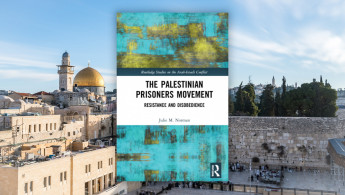The Palestinian Prisoners Movement: Resistance and Disobedience
“The prisoners’ movement has demonstrated a synergy over time with the broader Palestinian national movement, sometimes influencing the outside political struggle, and sometimes being influenced by external factors.”
Julie M. Norman’s succinct observation in the introduction of her book, The Palestinian Prisoners Movement: Resistance and Disobedience, (Routledge, 2021) traces the centrality of the Palestinian prisoners’ resistance through meticulous research based on oral historical narratives and archival literature from the public library in Nablus.
Referencing prison-based resistance other than the Palestinian struggle, the author emphasises the international perspective in terms of awareness and solidarity, while at the same time focusing on the specifics of the Palestinian prisoners' movement.
In terms of education and self-governance, the Palestinian prisoners' movement has been particularly influential. Its decline in the aftermath of the Oslo Accords reflects the author’s observation made in the introduction.
Norman writes, “Prisons represent one element of state concentrated power, while also functioning as sites of resistance and dissent.”
The Palestinian prisoners’ movement traces its origins back to post-1967 when Israel established its military occupation. “While the political factions on the outside embraced tactics of armed resistance during this period, the prisoners developed a repertoire of unarmed strategies that allowed for the evolution of a different kind of struggle,” Norman writes.
"Prisons represent one element of state concentrated power, while also functioning as sites of resistance and dissent”
Setting up the education system in prison was one of the foundations upon which Palestinian prisoners based their counterorder strategy. Prisoners from different factions collaborated together to maintain and deliver a comprehensive program that enriched ideological understanding as well as promoted the development of their respective factions.
One interviewee tells the author, “Love of the homeland became more rooted [in prison] for two reasons: my discussions with other people and my reading.”
The author notes that the learning process inside the prisons, in which all prisoners were expected to participate, correlated to engagement indirect forms of resistance. Educational material was copied by hand and prepared for transfer to other prisons, creating a collaborative network that mirrored the collective anti-colonial resistance outside prison.
|
While education provided the foundations, prisoners’ resistance inside prisons was undertaken in a way that would “create dilemmas of control and security for the prison administration.”
Collective hunger strikes remained by far the most disruptive for Israel – the death of a hunger striker would reflect negatively upon the government and its colonial policies of control.
At times, the concept of hunger strikes also became a means through which Palestinian prisoners could negotiate for better conditions prior to embarking upon the strike. The author explains how a shift in hunger strikes happened in line with the political situation outside the prison. Prior to the second intifada, prisoners embarked on hunger strikes to clamour for better conditions, as opposed to using such tactics of resistance for individual or collective release.
The changes in the Palestinian prisoners' movement in the pre and post-Oslo eras are discussed in detail by the author. As the Palestinian national movement fractured, so did the prisoners’ resistance inside prisons.
This stands in contrast to the prisoners' movement in the 1980s when it experienced its strongest era as a result of the ongoing participation and development of the Palestinian anti-colonial struggle on the outside.
"The prisoners’ struggle remains at the helm of Palestinian society, even at times when resistance is somewhat weakened"
While the first intifada strengthened the prisoners’ education, for example, the Oslo Accords brought about “a clash of the contradictory processes of state-building and national struggle.” With the Palestinian Authority invested in its new role, Palestinians faced additional surveillance and security from its own leaders as constraints on civil society and activism contributed to Palestinian repression.
From 1993 to 1999, less attention was given to rigorous learning in prisons and the shift in hunger strikes veered towards protesting administrative detention orders.
The release of veteran prisoners weakened Palestinian resistance behind bars. Notably, the negotiations leading up to the Oslo Accords fomented division among the prisoners, while the focus on state-building contributed to the demobilisation of Palestinian society and the weakening of popular resistance.
Norman writes, “mirroring the external political reality, the increasing divisions ultimately weakened the internal counterorder and the prisoners' movement more broadly.”
|
In terms of visibility and mobilisation, the prisoners’ struggle remains at the helm of Palestinian society, even at times when resistance is somewhat weakened. Palestinian families have all been impacted by incarceration, as Palestinians have experienced the highest incarceration rate in the world.
Conversely, it is also the Palestinian prisoners who are most prone to exploitation both by the media and the PA. International media sensationalises hunger strikes when a prisoner is on the verge of death, rather than contextualising the hunger strike within the Palestinian resistance.
The PA, on the other hand, has used Palestinian prisoners as bargaining chips post-Oslo, particularly in the 2014 diplomatic negotiations. The author writes, “The prisoners’ issue, like the broader Palestinian national cause, has been embraced, utilised and at times, exploited by a variety of actors who recognise its importance and potential impact.”
Nevertheless, despite the changes in Palestinian politics, the prisoners maintain the helm in terms of how central the movement is to the Palestinian national struggle. Norman’s research, particularly her focus on testimonies, brings the prisoners’ narrative to the fore and sheds light on the importance of not fragmenting the Palestinian struggle.
Ramona Wadi is an independent researcher, freelance journalist, book reviewer and blogger specialising in the struggle for memory in Chile and Palestine, colonial violence and the manipulation of international law.
Follow her on Twitter: @walzerscent



